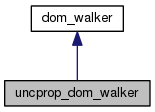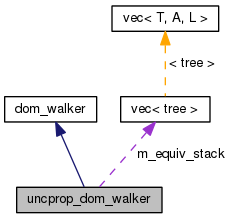uncprop_dom_walker Class Reference
Inheritance diagram for uncprop_dom_walker:

Collaboration diagram for uncprop_dom_walker:

Public Member Functions | |
| uncprop_dom_walker (cdi_direction direction) | |
| ~uncprop_dom_walker () | |
| virtual void | before_dom_children (basic_block) |
| virtual void | after_dom_children (basic_block) |
| void | walk (basic_block) |
Private Attributes | |
| vec< tree > | m_equiv_stack |
Constructor & Destructor Documentation
|
inline |
|
inline |
Member Function Documentation
|
virtual |
We have finished processing the dominator children of BB, perform any finalization actions in preparation for leaving this node in the dominator tree.
Pop the topmost value off the equiv stack.
If that value was non-null, then pop the topmost equivalency off
its equivalency stack.
Reimplemented from dom_walker.
References edge_def::aux, edge_equivalency::lhs, record_equiv(), and edge_equivalency::rhs.
|
virtual |
Function to call before the recursive walk of the dominator children.
If this block is dominated by a single incoming edge and that edge
has an equivalency, then record the equivalency and push the
VALUE onto EQUIV_STACK. Else push a NULL entry on EQUIV_STACK.
Reimplemented from dom_walker.
References execute(), gate_uncprop(), and tree_ssa_uncprop().
|
inherited |
Walk the dominator tree.
Recursively walk the dominator tree. BB is the basic block we are currently visiting.
Don't worry about unreachable blocks.
Callback for subclasses to do custom things before we have walked
the dominator children, but before we walk statements. Mark the current BB to be popped out of the recursion stack
once children are processed. NULL is used to mark pop operations in the recursion stack.
Callback allowing subclasses to do custom things after we have
walked dominator children, but before we walk statements.
References bb_postorder, free(), inverted_post_order_compute(), and postorder_num.
Field Documentation
As we enter each block we record the value for any edge equivalency
leading to this block. If no such edge equivalency exists, then we
record NULL. These equivalences are live until we leave the dominator
subtree rooted at the block where we record the equivalency.
Referenced by record_equiv(), and single_incoming_edge_ignoring_loop_edges().
The documentation for this class was generated from the following file:
